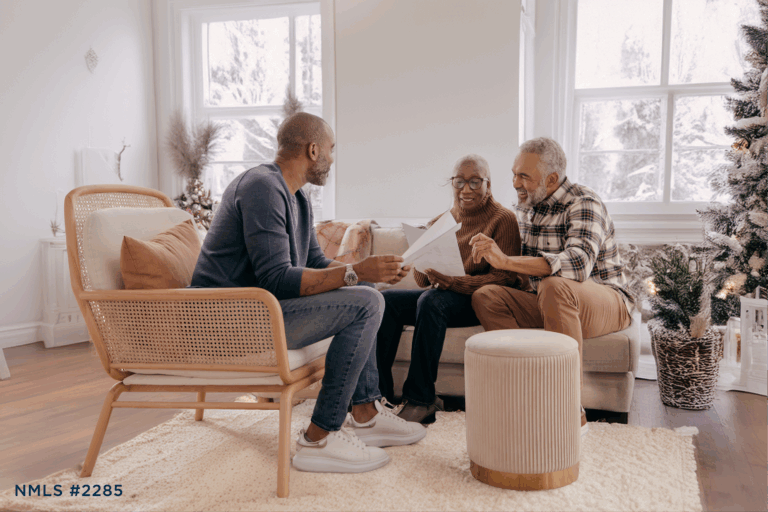[OPENING DISCLOSURE]
For reverse mortgage loans: The borrower must meet all loan obligations, including living in the property as the principal residence and paying property charges, including property taxes, fees, hazard insurance. The borrower must maintain the home. If the homeowner does not meet these loan obligations, then the loan will need to be repaid.
Can I Keep My House with a Reverse Mortgage?
One of the most common reverse mortgage questions is: “Will I still own my home?” This is a fair concern because your home is more than just an asset, it’s where life happens.
The good news is yes, you keep ownership of your home. A reverse mortgage does not transfer the title to the bank or lender. You remain the homeowner and can continue living in the property as long as you meet the loan’s requirements, which include maintaining the home, keeping up with property taxes, and paying your homeowner’s insurance.
A key advantage of a reverse mortgage is that it allows you to access some of the equity you have built over time without giving up your home. Understanding how the loan works and the questions that come up most often can help you decide if it’s the right option for you.
What Is a Reverse Mortgage?
A reverse mortgage is a loan designed for homeowners age 62 or older that allows you to turn part of your home equity into cash. In some cases, proprietary reverse mortgage products may be available to homeowners as young as 55.
Depending on the loan product you choose, you can receive your funds as a lump sum, fixed monthly payments, a line of credit, or a combination of these options.
Unlike a traditional mortgage, monthly principal and interest payments are not required. To keep the loan in good standing, borrowers must live in the home as their primary residence, stay current on property charges such as taxes, fees, and hazard insurance, and keep the home in good condition. If these obligations are not met, the loan becomes due and must be repaid.
Who owns my home with a reverse mortgage?
With a reverse mortgage, you remain the legal owner of your home. The title stays in your name, not the lender’s. Like any mortgage, the loan places a lien on the property, which gives the lender the right to be repaid when the loan ends.
This means you keep the same rights and responsibilities of homeownership, including the ability to live in your home as long as you meet the loan requirements. For many homeowners, this reassurance clears up one of the most common misconceptions about reverse mortgages: you can borrow against the equity you’ve built without giving up ownership of the place you call home.
Will My Children Still Inherit My House?
Your children or heirs can still inherit your home with a reverse mortgage. Because you remain the legal owner, the property is part of your estate, just as it would be with a traditional mortgage.
When the loan ends, your heirs will have options. They can choose to repay the loan and keep the home, or they can sell the home and use the proceeds to pay off the reverse mortgage. Any remaining equity after the loan is repaid belongs to your heirs.
For many families, this provides peace of mind. A reverse mortgage allows you to use your home’s equity during retirement while still leaving the choice of keeping or selling the home to your loved ones.
It’s also important to remember that while your heirs technically inherit the home you left them, they have no personal responsibility for your reverse mortgage debt. In the event the reverse mortgage loan amount exceeds the value of the home, your heirs can simply hand over ownership to the lender, and no additional debt passes on to them.
Can I Pay Back My Reverse Mortgage?
Yes, you can pay back a reverse mortgage. While you are not required to make monthly payments toward the loan, you always have the option to do so. Some homeowners choose to make voluntary payments toward interest or principal to help manage the loan balance.
The reverse mortgage is usually repaid when the borrower permanently moves out, passes away, or when the loan terms aren’t followed. At that point, the home sale proceeds are typically used to pay off the loan. If the home sells for more than what is owed, the remaining equity goes to you or your heirs.
In the end, you can use the equity in your home without the pressure of monthly payments, but you also have the freedom to pay it down at any time if that fits your financial goals.
The Takeaway
A reverse mortgage lets you maintain ownership of your home and use the equity you’ve built to support your retirement. While the loan must eventually be repaid, either by you or your heirs, it may offer some flexibility in how and when that repayment happens.
If you are considering a reverse mortgage, take time to understand the potential advantages, responsibilities, and long-term impact for you and your family. Speaking with a trusted advisor or reverse mortgage professional can help you decide if it is the right option for your financial goals.
[CLOSING DISCLOSURES]
This article is intended for general informational and educational purposes only and should not be construed as financial or tax advice. For more information about whether a reverse mortgage may be right for you, you should consult an independent financial advisor. For tax advice, please consult a tax professional.


